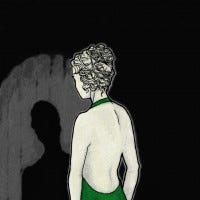Analysis: Teacher's Pet - Story In Don't Take It Personally, Babe
Gamasutra contributor Emily Short examines Christine Love's visual novel Don't Take It Personally, Babe, It Just Ain't Your Story, and shares why the otherwise charming

[Gamasutra contributor Emily Short examines Christine Love's visual novel Don't Take It Personally, Babe, It Just Ain't Your Story, and shares why the otherwise charming game sometimes feels "incomplete".] Don't Take It Personally, Babe, It Just Ain't Your Story has been out since April, and though it hasn't attracted quite the universal accolades of Digital: A Love Story, it's had lots of attention from lots of directions. It's a quirky piece about the concept of privacy in the post-Facebook world; like Digital: A Love Story, it tells its story mostly through an adapted version of computer technology we're well familiar with already. It's definitely worth playing; if you haven't played yet and would like to read a review, read one of those I just linked. Because what follows from here on is going to be a wholly spoiler-rich discussion of certain themes in the plot and the way they dovetail with Love's interaction choices. Seriously, it's all spoilers from here on. Ichigo's speech at the end of Don't Take It Personally, Babe touches briefly on an important theme: "I think your fundamental misunderstanding, John, is mistaking privacy for control of your personal boundaries." This is an important key to the whole story, but it's unevenly explored in the narrative. John Rook is created as an immature character who is bad at handling his own boundaries. His two divorces and his obvious lack of any personal life outside the classroom suggest a somewhat troubled background, and Ichigo also explicitly calls him out as immature during her final speech. John's problems on this front are legion. Teaching requires balance. If you don't like your students or don't care to establish a rapport with them, they'll sense that and be uncomfortable with you. On the other hand, you can't let your empathy and chumminess with them get in the way of providing an orderly and disciplined experience in the classroom. And you absolutely cannot let your own self-image depend on the emotional signals you're getting from a bunch of teenagers. You're the adult in the room. John's struggles with this show him as someone with considerably less self-awareness and control than he needs. His internal monologue about his students is occasionally harsh to an undeserved degree -- for instance, when he thinks about his contempt for Nolan because Nolan is a 16-year-old who doesn't pay attention to his studies. Most of the successful teachers I know have a somewhat more rounded view of their students than that and do not inherently have contempt for the young; if they do, they really don't belong in that line of work. Major decision points highlight this awkwardness. John should have been able to establish a distance between himself and Arianna, *not* by being cruel to her, but by keeping her away from his personal life and personal time in the first place. It's not her job to make sure he has an umbrella to get home with, and there are ways to put off offers like this without being mean. (The semi-"happy" ending with Arianna, in which he decides he's in love with her, is even creepier. It's easy enough to understand that he might be attracted to Arianna, but it takes a pretty damaged 38-year-old man to decide that a flighty 16-year-old is a suitable partner.) He should have been equipped to reprimand Taylor seriously but without descending to the language of "bitchiness" and meanness. She needs to hear a correction from someone who is not at her own level. He also -- and this point goes beyond his personal characterization -- should have had the institutional support to act when he thought a student was in danger of harming herself. The prank about Isabella is the least successful part of the plot for a number of reasons -- it's improbable that it would work, it casts the students and a parent who should know better in a very negative light, and it's telegraphed repeatedly so that the player is likely to have guessed well before John does. But beyond all that, schools do tend to take the wellbeing of their students extremely seriously and to have institutional provisions for following up on implied suicide threats or other signs of major emotional distress. It's beyond belief that the administration would have brushed off a serious inquiry by telling John it's not worth trying to follow up. Obviously, there is nothing wrong with fiction that highlights a problem by having a character handle it badly. I also have no objection to interactive stories whose protagonists are not completely under the player's control, who have neuroses and personal limitations. The trick isn't that Don't Take It Personally, Babe makes John's boundary issues a problem but that it doesn't problematize them. The player has no option to explore his failings interactively. His violations of privacy are front and center, in a way that encourages the player to be complicit in them and think about them, even though (in practice) the player has no real choices and is not allowed to go through the game without reading all of the students' private messages. The interaction is all about privacy. The boundary choices by contrast are in a strange grey zone. John is aware in some of these cases that there are better decisions he could be making, better advice he could be giving, better ways he could be handling the student with a crush on him. The player's choices don't really explore this territory in the same way that they explore the privacy issue, though. John's biggest violations (especially with regard to Arianna) never have significant repercussions. The player is never given the option to handle some of these situations with genuine sensitivity and maturity. (Contrast Stephen Bond's Rameses, whose neurotic protagonist frequently fantasizes about sensible or defiant responses he might make, but never has the courage to follow through when the player chooses those options.) The whole question of how to behave well as a teacher is only fuzzily addressed because John not only doesn't know how to do it but (apparently) can't even imagine what the correct behavior might look like. And without some focus on how personal boundaries might work properly in the context of reduced privacy, the story -- despite its charming characters, colorful dialogue, and important questions -- feels a little incomplete. [Emily Short is an interactive fiction author and part of the team behind Inform 7, a language for IF creation. She also maintains a blog on interactive fiction and related topics. She also contracts for story and design work with game developers from time to time, and will disclose conflicts with story subjects if any exist. She can be reached at emshort AT mindspring DOT com.]
About the Author
You May Also Like









